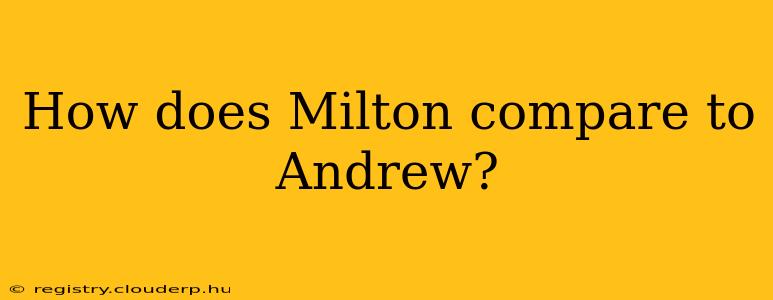How Does Milton Compare to Andrew? A Deep Dive into Two Literary Giants
Comparing Milton and Andrew requires specifying which "Andrew" we're discussing. The most likely candidates are Andrew Marvell, a contemporary of John Milton, or another significant author with the first name Andrew. For the sake of clarity, and given the prominence of both poets within English literature, this comparison will focus on John Milton and Andrew Marvell.
Both Milton and Marvell were major figures in 17th-century English literature, writing during the tumultuous period of the English Civil War and the Interregnum. However, their styles, themes, and overall impact differ significantly.
Milton: The Epic Poet of Grand Scale and Religious Vision
John Milton is best known for his epic poem Paradise Lost, a monumental work exploring the biblical story of the Fall of Man. His style is characterized by:
- Grandiose scope and ambition: Milton tackled vast theological and philosophical themes, employing a highly elevated and elaborate style. His poetry is marked by its ambitious scale and the sheer power of its language.
- Blank verse mastery: He is a master of blank verse (unrhymed iambic pentameter), which he used to create a powerful and flexible rhythm suited to his epic narrative.
- Strong religious conviction: Milton's works are deeply informed by his Puritan beliefs, and his engagement with religious themes is central to his poetic project. He explored themes of free will, obedience, and the nature of good and evil.
- Classical influences: Milton's work shows a profound engagement with classical literature and mythology, weaving these elements into his distinctly Christian worldview.
Marvell: The Witty and Lyrical Master of Paradox
Andrew Marvell, while also a significant poet of the era, offers a stark contrast to Milton. His poetry is known for:
- Wit and intellectual subtlety: Marvell's poems are often characterized by their witty and paradoxical nature. He explores complex ideas with elegance and precision, often using irony and understatement.
- Lyric grace and brevity: Unlike Milton's epic scope, Marvell's poems are typically shorter and more focused, showcasing his mastery of lyrical form.
- Secular and worldly themes: While touching on religious themes, Marvell's poetry often focuses on more secular concerns, including love, nature, and political intrigue.
- Metaphysical elements: Marvell shares some affinity with the Metaphysical poets, displaying a penchant for intellectual conceits and surprising imagery.
Key Differences Summarized:
| Feature | John Milton | Andrew Marvell |
|---|---|---|
| Style | Grandiose, epic, elevated, blank verse | Witty, lyrical, concise, paradoxical |
| Scope | Vast, ambitious, theological | Focused, lyrical, worldly |
| Themes | Religious, moral, philosophical | Love, nature, politics, intellectual |
| Length of Works | Long epic poems, substantial prose works | Shorter poems, more concise and focused |
How Do Their Works Compare in Impact?
Both poets left a lasting legacy on English literature. Milton's Paradise Lost remains one of the greatest epic poems in the English language, its influence extending far beyond the literary sphere. Marvell's poems, while perhaps less widely read, are highly valued for their wit, artistry, and intellectual depth, contributing significantly to the tradition of English lyric poetry. Their distinct styles and thematic concerns reflect the diverse landscape of 17th-century English literature.
Frequently Asked Questions (PAAs)
While there aren't specific PAAs for this exact comparison on search engines, here are some relevant questions and answers that might arise:
What are the major differences between Milton's and Marvell's poetry? The main differences lie in scale and style. Milton's poetry is epic, grand, and religiously focused, using blank verse. Marvell's is more concise, witty, often exploring secular themes with lyrical grace and utilizing a variety of forms.
Who was more influential: Milton or Marvell? Milton's impact is arguably broader due to the enduring popularity and influence of Paradise Lost. However, Marvell’s witty and insightful poetry has secured him a prominent place in literary history, influencing later poets with his elegant style and intellectual depth.
Did Milton and Marvell know each other? While there's no definitive proof they were close friends, they existed within the same literary circles and it’s likely they knew of, and possibly met, each other given their prominent positions during the same historical period.
This comparison provides a nuanced understanding of the distinct contributions of John Milton and Andrew Marvell to English literature. Their contrasting styles and thematic interests offer a rich tapestry of poetic expression reflecting the complex intellectual and political landscape of their time.

